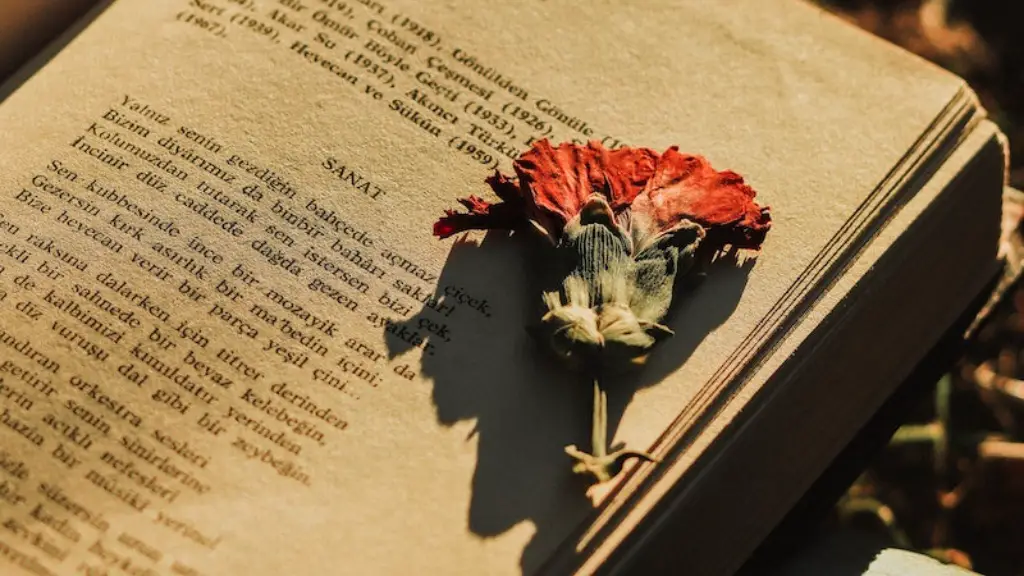Definition of Poetry
Poetry is a form of writing in which words are arranged to create rhythm, evocative imagery and emotion. It is often described as having an “atmosphere” or “mood.” Poetry is usually written to be read out loud, and it is often written to express emotion or to tell a story.
Preparing to Write the Essay
The first step to writing an essay on poetry is to read the poem closely. Consider the context, style, imagery, and diction of the poem. Pay attention to the speaker’s perspective and how the poem may be related to other works of literature. Research the poem, if necessary, and make notes of your thoughts and impressions. This can help you build a better understanding of the poem before you start writing.
Getting Started
Once you have a good understanding of the poem, begin to plan your essay. Consider the overall theme of the poem, and use that as a starting point. Think about the mood and tone of the poem, what messages it conveys, and any symbolism used. You may also want to consider the structure of the poem and how it contributes to its meaning. After brainstorming, develop an outline with your main points and supporting evidence. This outline can serve as a roadmap throughout the writing process.
Making a Argument
The body of your essay should provide support for your overall argument. Explain how the poem’s imagery, structure, and diction contribute to the overall meaning. Use quotes from the poem as evidence to support your points. In your analysis, consider how the poem’s form and content affect the poem’s meaning. Pay close attention to the language of the poem and make sure to explain the purpose of any figures of speech.
Crediting the Poet
Whenever possible, credit the poet for the work. This can be done using the poet’s name or the title of the poem. Try to credit the poet in a natural way that doesn’t interrupt the flow of your essay. This will serve as an acknowledgement of why the poem is so powerful and where it comes from.
Conclusion
An essay on a poem should not simply be a summary of the poem’s plot. Instead, it should be an exploration of the poem’s meaning and how the poet communicates that meaning. Be sure to make an argument about the poem and support it using evidence. Lastly, make sure to credit the poet for the poem’s influence and impact.
Researching the Poet
Before writing an essay on poetry, it is important to research the poet. Understand the poet’s influences, themes, and style. You may also want to explore the social, political, and historical context of the poem. This will allow you to see the poem in a broader context and better assess the poem’s message.
Considering the Audience
When writing an essay on poetry, consider your audience. Are you writing for scholars or for a general audience? Depending on the context of the poem, you may want to focus on one particular aspect of the poem. When writing for a general audience, explain the poem’s message in plain language and be sure to explain any difficult words or phrases.
Formulating a Thesis
A thesis statement is an essential part of any essay. Think about the message of the poem and how you might convey that in one sentence. This sentence should be clear, concise, and provide the basis for your paper. Sometimes it is helpful to state the thesis at the beginning of the essay. This will set the tone and direction of the entire essay.
Using Metaphors, Similes and Personification
Many poems make use of metaphors, similes, and personification to convey their message. Consider the purpose of these literary devices and what they may be illustrating in the poem. Pay attention to the imagery and diction of the poem, and try to explain how it contributes to the poem’s overall meaning.
Exploring Tone, Mood and Style
When analyzing a poem, you should consider the tone, mood, and style of the poem. Pay attention to the poet’s use of language, diction, imagery, structure, and form. Consider how these contribute to the poem’s overall message. Think about how the poet is using these elements to create a certain atmosphere or convey a certain emotion.
Using Comparisons and Contrasts
Consider comparing or contrasting the poem to other works of poetry. Not only can this help you better understand the poem’s purpose, but it can also help you explain how the poem differs from other works. This can be a helpful way to explain how the poem stands out from other works and why it is significant.
Interpreting Imagery
Imagery is an essential part of poetry. Consider the imagery of the poem, what it may be depicting, and how this contributes to the overall message of the poem. Look for any metaphors or symbols and think about how these might be interpreted. Analyzing the imagery and symbolism of the poem can help you explain its deeper meaning.
Exploring Allusions
Another important aspect to consider while analyzing a poem is allusions. Writers often make allusions to other works, often to create a particular tone or atmosphere. Think about how this allusion might be affecting the poem’s overall message and consider why the poet chose to make the reference. This can help you interpret the poem in a more comprehensive way.
Understanding the Subtext
Look for any subtext within the poem. Consider what the poem may be saying “between the lines” and how this may add to the poem’s overall meaning. Pay close attention to the speaker’s perspective and think about the themes and ideas that the poem might be exploring.
Analyzing Rhyme and Meter
Finally, consider the poem’s rhyme and meter. Pay attention to the poem’s rhythm, how it contributes to the poem’s overall tone, and how it might be affecting the poem’s meaning. Think about the purpose of the sound patterns and how they might be affecting the reader’s experience.




